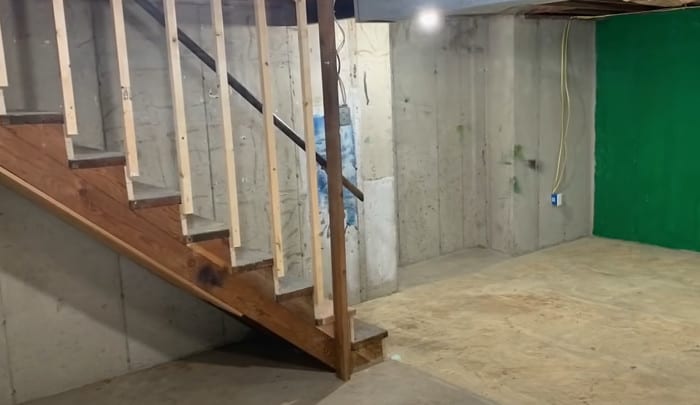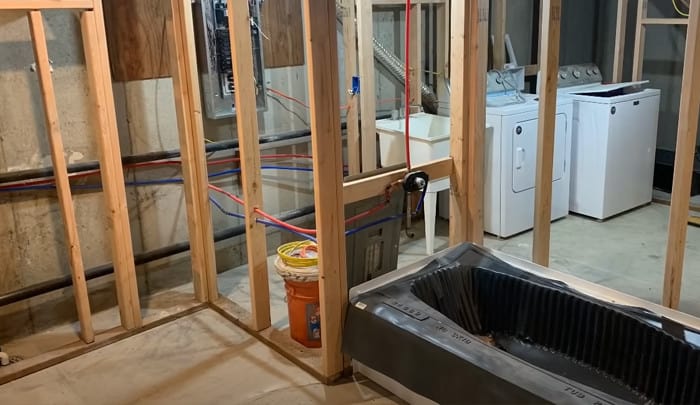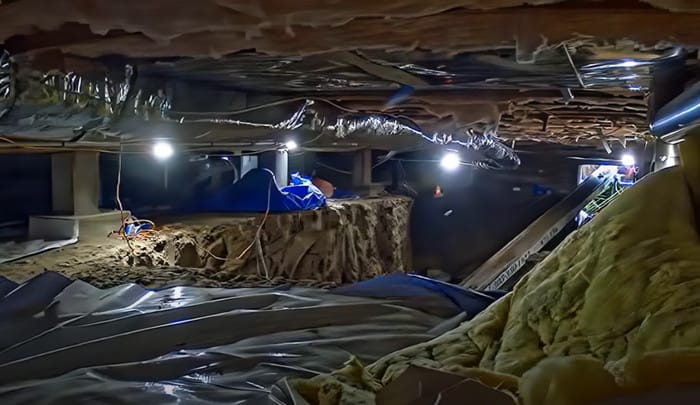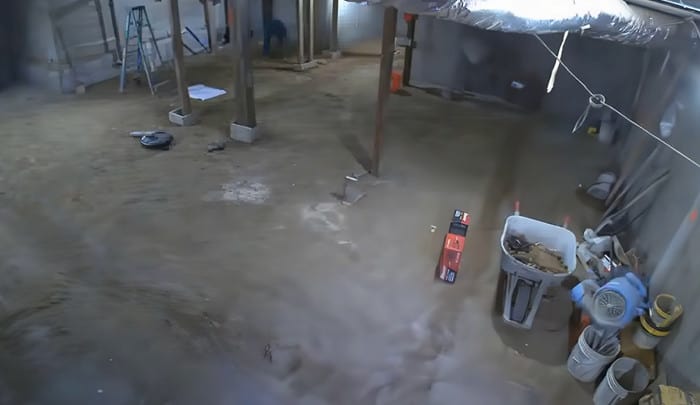If the idea of creating a basement on the property of your own home has ever crossed your mind, you’re likely to be sitting on a bundle of questions. What kind of regulations surround such a project? What does the timeline look like? How expensive can you expect it to be sitting on a bundle of questions. What kind of regulations surround such a project? What does the timeline look like? How expensive can you expect it to be?
Today we’ll be tackling the basics of adding a basement to your home and giving you everything you need to move closer towards this potentially transformative project. So grab a cup of coffee and a legal pad, because it’s time to dive into the world of basements!
- Can You Add a Basement To a House?
- Basement Renovations vs Basement Additions
- What Are the Costs of Adding a Basement?
- What Is the Process of Adding a Basement?
- Are There Other Options to Consider?
- Wrap Up: Is It Worth It to Add a Basement?
- Responses to Common Questions with Detailed Explanations
- References
The cost of adding a basement to a house can vary greatly depending on size and complexity. A typical basement addition can range from $20,000-$50,000 or more depending on the design and materials used.
“Adding a basement to an existing house can pose a significant number of challenges and it’s crucial to know about these to make a sound decision. The primary issue is the technical complexity associated with the process, including the arduous task of underpinning and stabilizing the existing structure to prevent collapse. However, with careful planning, technical insights, and robust architectural support, which I’ve gathered over years of experience in this field, it is absolutely feasible. Remember, every edifice poses a unique challenge and offers unique possibilities in terms of basement additions.”
Giovanni Vespucci, Civil Engineer
Can You Add a Basement To a House?
The short answer is yes, but it’s not a project to be taken lightly. It can be costly, highly disruptive and can require specialized permits and inspections. Before starting, homeowners should understand what’s involved in the process.
To add a basement to an existing home requires extensive knowledge of construction, either that of the homeowner or of the contractor doing the job. Depending on the grade of the land, excavation may be required to create enough height for a full basement. This can require special permits for large-scale excavation or for creating footings, installing a floor slab and putting in walls.
The cost of digging out a full basement may exceed $50,000 dollars depending on the size of the area and the grade of soil meant for removal. There are other factors that can also affect cost; like any additional plans for a bathroom, or egress windows when required by building codes.
One of the strongest arguments against adding a basement has to do with dampness, which may cause mold and associated health problems over time. A proper foundation drainage system should be planned before beginning any excavation to prevent damp basements. Installing a high-quality sump pump may be another way to make sure moisture levels remain low and eliminate any issues related to ground water seepage.
Adding a basement is overall very possible, but comes with many considerations such as potential disruption to your daily routine (loud machinery and dust), in addition to extra costs attributed to permits and inspections necessary for larger projects. It’s important for homeowners to work with experienced professionals who understand what it takes to build correctly and meet all safety requirements.

Leading into our following section about “Basement Renovations vs Basement Additions”–it’s important for homeowners decide whether they want to renovate their existing basements or if creating an entirely new one is worth it for their needs and budget.
Basement Renovations vs Basement Additions
One important factor to consider when contemplating the addition of a basement to your home is whether you should begin with a renovation or an addition. Basement renovations involve transforming an existing space into something new, while basement additions are the process of adding more square footage and additional rooms. Both can be beneficial depending on what type of project you’re looking to take on.
Renovations generally tend to cost less than additions, as existing materials can often be reused and transformed for use in the new design. That said, some may require complete demolition in order to properly create the new design, which can increase costs significantly. Additionally, in the case of a full-scale renovation, it could take longer to complete the project due to unforeseen issues that may arise in the remodeling process.
Basement additions typically involve more time and money investment than a renovation but they provide more flexibility in terms of designs. Constructing an entirely new room beneath an existing structure also offers extra privacy since soundproofing between floors becomes easier with an addition. Additional foundations may need to be built in order to support the added weight if you’re building a large space. Additionally, because this type of construction requires many labor hours, it is often seen as a more costly option than just renovating an existing area.
Ultimately deciding between a basement renovation and addition depends on the overall scope of your project plan. Regardless of which route you decide to go, it is important to remember that both processes will require careful thought and planning in order to have successful results. For inspiration, you might want to check out some before and after basement transformations to see what’s possible. Moving forward into the next section about “How To Tell The Difference” will help you learn strategies to evaluate your particular project and identify which approach is best suited for your needs after considering all possible factors.
Key Points to Remember
When considering a basement renovation or addition to your home, there are many factors to consider, including whether the renovation of existing materials is desired or if additional square footage and rooms should be added. Renovations tend to cost less but may take longer than additions, while additions require more time and money but offer greater flexibility in design. Careful planning is necessary for either choice to ensure successful results.

How to Tell the Difference
When deciding whether to add a basement or an additional above-ground level to your home, there are some key differences to consider. First, basements require excavation of the earth below, whereas adding an additional level typically involves building up from the existing foundation. Thus, constructing a basement is usually more costly and labour-intensive than simply building up. Additionally, it is often difficult for a homeowner to obtain financing for basement construction, as lenders are generally reluctant to loan on something that can’t be seen from the outside and can’t immediately increase their collateral value.
On the plus side, basements typically offer much larger spaces than additional levels can provide because they avoid jumping through zoning regulations and height limitations set out by local governments. Furthermore, while an additional level may provide more overall living space in theory, there may be restrictions on what kind of extra room can be used (for example, you might not be able to install a full kitchen or bathroom). Of course, some locations have virtually no zoning restrictions so these costs would apply equally to any structure built on your home’s existing footprint. Furthermore, finished basements can also provide much more storage space than do extra stories.
In the end, it comes down to personal preference—as with most home improvement projects—and willingness to commit time and money along with balancing desired outcomes with potential risks. Knowing the differences between adding a basement versus building up provides crucial groundwork for customers to make decisions regarding their projects. With this information in hand, let’s move onto exploring the pros & cons of each option in greater detail.
Pros & Cons of Each
Weighing pros and cons of adding a basement to your home can be an important factor when considering whether or not to go through with the project. On one hand, having a basement can add more usable space to your home and provide ample storage room. It can also bring in additional value to the home if you ever plan on selling in the future. Adding a basement could be seen as a sound investment, however there are drawbacks to take into consideration.
Adding a basement requires extensive construction, which can be expensive and time consuming. Also, many homeowners find that water damage is a common issue amongst basements, and this might require some sort of additional waterproofing system install. For those with crawl spaces, crawl space encapsulation might be a necessary step to prevent moisture issues. When precautions are taken and long-term costs are factored in, adding a basement may not be worthwhile for all home owners.
No matter the homeowner’s decision, it is important to properly weigh all the options and consider any potential risks involved before making the final decision. If after taking into account the pros and cons, you are still interested in adding a basement to your home than it’s time to factor in what kind of costs would be associated with such a task. What are the costs of adding a basement? It’s important to understand what considerations need to be made first before moviing forward with the next steps.
What Are the Costs of Adding a Basement?
When determining whether you should add a basement to your home, one of the most important things to consider is the cost. Depending on the size of the basement and its complexity, the cost can range from just a few thousand dollars to over $100,000. If you’re looking for a basic storage space with limited or no utilities, it is generally less expensive than if you’re looking to create an additional living space with utilities and amenities. Moreover, regardless of the complexity of the job, excavation and waterproofing costs can be significant.
On the other hand, while adding a basement is usually more expensive than renovating existing spaces in your home, it can also save you money in the long run. Once installed, basements are usually significantly more efficient than other more exposed parts of your home, meaning you could save hundreds of dollars in energy costs each year. The savings could ultimately offset any extra cost in installation and make adding a basement much more financially feasible.
While there are pros and cons to adding a basement when it comes to cost considerations, ultimately it comes down to which takes precedence for you—the initial cost or potential long-term savings. After taking all aspects into account, you’ll be able to determine if adding a basement to your home is worth the expense.
Now that we have explored the costs of adding a basement, let’s look at what is involved in the process of doing so in our next section.
What Is the Process of Adding a Basement?
Adding a basement to your home is a complicated and involved task, requiring several steps before you can construct the actual structure. Before beginning, it is important to consider the pros and cons of doing so. A basement can dramatically increase living space for a fraction of the cost of constructing an entirely new addition, however it could require more preparation than anticipated. It is essential to plan ahead and educate yourself on the process before investing in a project like this.
The process of adding a basement generally involves excavation, foundation construction, finalizing building plans and securing permits. Depending on the current state of your property, there may be additional tasks or considerations that need to be taken into account. Excavation may involve removing hardscaping elements such as patios or walkways and plenty of demolition work within existing structures. Foundations are necessary for any addition, even if you don’t want a full basement but only lower-level access. Once you have completed the basic structure preparations, then you need to draw up floor plans – usually hiring an architect – in order to meet local zoning ordinances and any restrictions imposed by your homeowner’s association (if applicable). Finally, you’ll need to complete applications for all necessary permits that enable you to break ground.
Moving forward with adding a basement to your home demands careful thought and consideration of all possible outcomes; at minimum it will require significant time and resources to achieve desired results. It is essential to embark upon this endeavor with informed knowledge as best prepares you for success. The next step in the process is understanding essential elements of excavation, foundation construction, creating building plans, and obtaining required permits prior to beginning any work.

Excavation, Foundation, Building Plans & Permit
When considering whether or not to add a basement to your home, there are several steps that need to be taken. The first is excavation. Depending on the size of the basement and access to the area where excavation needs to occur, this can become quite involved. If excavation occurs near an existing foundation or structure, expert engineering may need to be consulted to avoid disruption.
The next step is to lay a foundation for the basement. It’s important for home owners to work with professional contractors when it comes to construction of any kind and this stage is particularly important because it will help ensure structural integrity and advise on potential architectural issues that could present problems down the road. Home owners should also consider talking to their contractor about waterproofing measures such as French drains, sump pumps in order to properly protect the foundation from water infiltration due to external factors such as weather conditions or ill functioning plumbing.
Once these decisions are made, then building plans should be drawn up. Here both home owner and contractor should decide on any special features such as egress windows in case of emergencies requiring a second route of escape or fire rated doors between floors. All of these decisions should be carefully documented especially if in the future permits are requested by local agencies in order have resulting changes included into the code requirements laid out in those permits.
Finally, existing local codes and ordinances must be taken into consideration when adding a basement as they relate to obtaining necessary permit approvals from local agencies. Such practical applications like where egress windows can be placed, how hoists for material delivery compare with handicap accessibility requirements and even whether or not extended foundations are allowed based on floodplain regulations all affect how permits will eventually be issued for any additional work done in regards to adding a basement.
Therefore opinionated stakeholders on both sides of the argument might need to weigh in before moving forward with plans related to adding a basement so clear cut decisions can be made in relation to best practices associated with all things related to this project.
Are there other options to consider? Next we’ll discuss what alternative solutions may exist when deciding whether or not a basement addition is right for you and your family!
- According to HomeAdvisor, the average cost of adding a basement is approximately $25,000 for an unfinished space and $45,000 for a finished space.
- It is estimated that the cost per square foot for adding a basement is between $20 to $50.
- According to Money Crashers, it can cost anywhere from $70 to $200 per square foot depending on the size and complexity of the project.

Are There Other Options to Consider?
Are there other options to consider if you don’t want to add a basement to your home? If you’re looking for more square footage without extensive remodeling and expense, there are other options that may be worth considering.
Adding on to the second floor is one such alternative, but this can be very expensive depending on the amount of additional space required, the structural support needed, and whether or not local zoning laws allow it. It may also require significant modifications to the exterior design of the home and could result in more noise from overhead traffic.
Finishing an existing basement or attic space is another alternative that doesn’t involve taking up new space on the ground. By finishing a room found within your existing walls, insulation, and flooring, you can create usable space for livability, storage, or entertainment purposes. This option is less intrusive than building outwards and does not require as much construction and planning. Depending on what the finished product will be used for, however, it may require electrical or plumbing work that is beyond the skills of a do-it-yourselfer.
No matter what option homeowners choose, they may need to investigate potential zoning regulations that could determine their plans and talk with contractors if they plan on subcontracting any of the work. Now that we have discussed some alternatives to adding a basement to your home, let’s move on to our final section about Wrap Up: Is It Worth It To Add A Basement?
Wrap Up: Is It Worth It to Add a Basement?
The decision to add a basement is ultimately up to the homeowner and must be made on an individual basis. Like any home improvement or renovation project, there are both advantages and drawbacks associated with the construction of a basement. While adding a basement will increase the capacity of your living space and can significantly increase the value of your home, it is also expensive and may require significant sacrifices in terms of layout and exterior design.
On the plus side, assuming you already have enough room in your existing backyard to fit the basement, this addition may provide you with more usable living space within the same overall size of the home—which can be ideal for families with growing needs over time. Adding a full-scale basement could also provide additional storage space, or even an opportunity to create an entertainment area or indoor gym.
In addition to the act of actually constructing the basement, you may also be able to claim tax incentives for energy efficient features that you choose to include in your underground living space such as extra insulation, solar heating systems, or other energy-saving means. As mentioned previously, improvements like these could help make future utility costs more affordable in addition to making a return on investment when it comes time to sell your home.
However, even if you have room in your backyard, this project is not without its downsides. First off, construction projects come with high costs not only for materials but also labor expenses. Professional contractors may receive anywhere from $100-$250 per square foot depending on what type of work they are performing and what kind of problems they might encounter along the way. There are also potential zoning requirements that have to be observed as well as possible setbacks that could complicate design plans and layout ideas.
At the end of the day, it’s essential that homeowners do their research before committing to adding a basement so they know exactly what they are getting into. This can help them make an informed decision about whether this type of project would truly benefit them in the long run by providing increased living space while at the same time understanding how much of an investment it will take to complete it successfully and safely.
Responses to Common Questions with Detailed Explanations
What types of foundations are needed to add a basement to a house?
There are several types of foundations that can be used to add a basement to a house. The most common type is a poured concrete foundation, as this is the most straightforward and economical solution for basement construction. It requires digging out the area and then pouring reinforced concrete walls in place to form the foundation. Another option is a pier foundation, which uses pre-cast concrete blocks or columns that are driven into the ground, with connecting beams or slabs tying all of the components together. Depending on the soil conditions and local codes, block or masonry foundations may also be necessary. Ultimately, it’s important to consult with a professional engineer or building contractor for advice about which type of foundation is right for your particular project.
What is the average cost of adding a basement to a house?
The average cost of adding a basement to a house depends on several factors, including the size of the basement, whether it is being built from scratch or renovating an existing space, and any added features. Generally speaking, adding a basement can cost anywhere from $10,000 to upwards of $50,000 or more. This cost can be greatly affected by whether excavation and waterproofing will be required, which can add thousands of dollars to the project. It’s also important to consider permitting expenses and professional fees if you’re hiring a contractor. Ultimately, the expense associated with adding a basement to your home should be weighed against what you’ll gain from this addition.
What are the necessary steps to add a basement to a house?
The necessary steps to add a basement to a house vary depending on the type of basement you want. Generally, the process involves excavation to create space for your basement, installation of footings and foundation walls, pouring the concrete floor and installing waterproofing systems.
First, you’ll need to excavate soil around the exterior of your home in order to create enough space for your new basement. This may require you to lift your existing foundation, move utilities or even remove trees or landscaping. Next, you’ll need to install footings and foundation walls. Depending on local codes, these might be constructed out of concrete, wood or stone blocks. Once the footings and walls are in place, a concrete floor needs to be poured. This can range from two inches thick for walls only up to eight inches thick for load-bearing walls and floors.
Finally, any successful basement project needs an effective water management system. Depending on the type of basement construction and local building codes this could include drainage systems, sump pumps, waterproofing membrane systems or other mechanisms that help prevent moisture build-up inside the space.
These steps will ensure that you have a well-built and structurally sound basement. With proper planning and attention to detail, it’s possible to add value to your home while creating extra living space with a basement addition.
References
https://edensstructural.com/everything-need-know-basement-construction/
https://www.theplancollection.com/blog/pros-and-cons-of-basement-foundations





Avoid cheaping out on waterproofing measures if you want your basement to last. Lack of proper damp proofing can lead to a variety of costly problems. Experienced contractors like me always consider the regions’ climate and water table before recommending the appropriate extent of waterproofing.
I couldn’t agree more, Xander. In fact, in our colder regions, hydrostatic pressure can become an issue which could compromise the integrity of the basement walls. Proper waterproofing is indeed a worthy investment.
During my years of overseeing basement projects, I’ve learned that every local jurisdiction has unique permitting standards, always check with your local permit office before initiating any construction.
Don’t overlook the importance of properly weatherproofing your basement. I’ve seen people skip this step due to cost, only for them to pay a hefty price when their so-called new basement became a pond after heavy rain.
I couldn’t agree more, Dorothea. In fact, during my tenure as a construction supervisor, we had a client who disregarded our advice on weatherproofing – their basement was indeed transformed into an indoor swimming pool after the first major rainfall!
Branwen, as an architect who spent more than two decades creating spaces for families, I can second your point regarding the importance of weatherproofing. Basements indeed need extra care to deal with potential flooding issues due to their location and construction features. Ignoring this crucial aspect can be disastrous in the long run – fixing water leakage issues can cost even more than constructing a fresh basement. It’s best to invest in preventative measures like waterproofing during the initial stages; it pays off grandly over time.
Xavier, I agree with your point regarding preventative waterproofing measures during initial basement construction. My experience in real estate has shown me that initial cost of waterproofing can save homeowners significant hassle and money down the line.